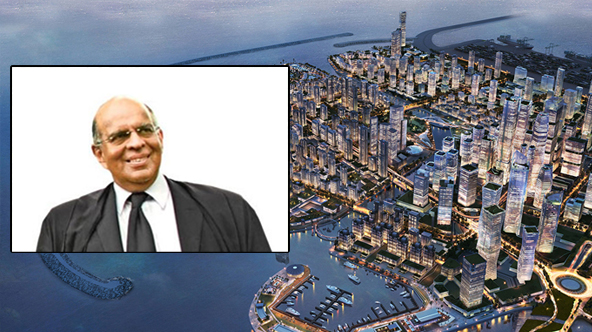It is the President, who ultimately is responsible for the administration of the Special Economic Zone in Colombo Port City, the President’s Secretary informed the Supreme Court today.
President’s Counsel Romesh de Silva appearing for the Secretary to the President, Dr P.B. Jayasundera made these remarks, when the nineteen Special Determination petitions filed challenging the constitutionality of the Colombo Port City Economic Commission Bill, was taken up for oral submissions in the Supreme Court.
Refuting the allegations levelled by petitioners that there is no regulatory body to scrutinize the activities of the Colombo Port City Project, De Silva said even the Master Plan of the project would be prepared, in consultation with the President.
The commission on the Colombo Port City Project is appointed by the President. That is in terms of Article 3 and 4 of the constitution. That is the exercise of people’s executive power by the President. The president appoints the members of the Commission. What is wrong if the President appoints the members of the Commission in terms of Article 4 of the constitution, De Silva questioned.
In Sri Lanka, the executive power of the people is exercised by the President, elected by the people. We are now taking away the concept of the sovereignty of Parliament which is more applicable in Britain. This is a commission controlled by the President. The Master Plan of the Port City Project has to have the approval of the President, not by anybody else. It is necessary to work within that Master Plan. All the administration activities are within the control of the Commission. It is a very important matter. The Master Plan of the project is prepared in consultation with the President. There will be no master plan if the President does not approve it. Subsequently, the commission would execute the Master Plan, De Silva further added.
De Silva argued that the President has the executive power to appoint a commission to carry out the administration activities of the Colombo Port City Project.
“When the executive power is vested with the President, it does not need anybody else’s consent. The establishment of the commission is well within the four corners of our constitution. The executive power of the people is exercised by President”, he further said.
Meanwhile, Romesh de Silva PC informed the court that none of the petitioners have challenged the concept of Special Security Zone (SEZ) because of its significance for the advancement of the national economy.
“Most of the petitioners including Samaji Jana Balawegaya (SJB), United National Party (UNP) and the Bar Association of Sri Lanka (BASL) have agreed that it is necessary to have an SEZ. That is an agreed concept. Nobody is challenging the concept of SEZ.
The main features of the SEZ are that it creates an area for an economic zone. It should create conditions conducive necessary for an SEZ. We have to attract investors. We have to give them special intensives,” said De Silva. Expressing views regarding the members of the Port City Commission, De Silva said that his client is agreeable to appoint few members of the commission from Sri Lankan citizens.
All Commissions whether it is a Public Service Commission or Election Commission can have non-citizens. In the recent past, there was a dual citizenship holder in the Election Commission. Except for UDA, the President can appoint non-citizens, even to the office of Chief Justice or Judges of the Supreme Court. Why only objections here, De Silva said.
Meanwhile, Romesh de Silva said the appointment made by the President can be challenged in court.
“Any appointment to any of this commission can be challenged by way of a Fundamental Rights petition. If the court wants, my client will recommend that there will be a minimum of two or three Sri Lankans. However, it would give a license to fill the balance from non-citizens. If the criteria necessary for appointments is not followed, it can be challenged through a Fundamental Rights petition. The Fundamental Rights jurisdiction of this court has not taken away. When the President makes appointments it can be challenged in courts”, said De Silva.
Meanwhile, De Silva said that the bill has not taken away the jurisdiction of courts through the arbitration process for the settlement of disputes. The arbitration process was introduced to expedite the financial disputes.
Meanwhile, President’s Counsel GaminiMarapana and Navin Marapana PC, who is representing Minister Prof. G.L. Peiris, argued that there is no need to refer the bill to the Provincial Councils since none of them is currently functioning.
A Supreme Court five-judge-bench comprising Chief Justice Jayantha Jayasuriya, Justice Buwaneka Aluwihare, Justice PriyanthaJayawardena, Justice Murdu Fernando and Justice Janak de Silva fixed the petitions for further hearing for tomorrow (22). The intervention petitioners are to present their further oral submissions from 9:30 am tomorrow.
Nineteen petitions have been filed so far against the Colombo Port City Economic Commission Bill. They are by; Samagi Jana BalawegayaGeneral Secretary Ranjith Madduma Bandara, SJB Parliamentarian Harshana Rajakaruna, former JVP Parliamentarian WasanthaSamarasinghe, UNP Chairman VajiraAbeywardena, UNP General Secretary PalithaRange Bandara, Oshala Herath, Dr AjanthaPerera, Jeran Jagatheesan who contested the 2020 General Election under the UNP ticket, President of BASL Saliya Pieris PC, BASL Secretary Rajiv Amarasuriya, Engineer KapilaRenuka Perera, Centre for Policy Alternatives and it’s Executive Director PaikiasothySaravanamuttu, Transparency International Sri Lanka (TISL), Ven. Muruththettuwe Ananda Thera, G.S. Shyamalee, NaganandaKodituwakku, Rajika Kodituwakku and Trade Union activist Lesley Devendra.
The petitioners are seeking a declaration that the Bill in whole or in part requires the approval by people at a Referendum and requires a two-thirds majority in Parliament.
Meanwhile, eleven intervention petitioners including Minister Prof. G.L. Peiris, Secretary to the President Dr P.B. Jayasundera, Sri Lanka Podujana Peramuna (SLPP) General Secretary Attorney-At-Law Sagara Kariyawasam, Athulade Silva, SLPP Lawyers’ Association, Secretary to the Minister of Finance and Secretary to the Cabinet Ministers have sought the Court’s permission to present their submissions, in support of the bill.





